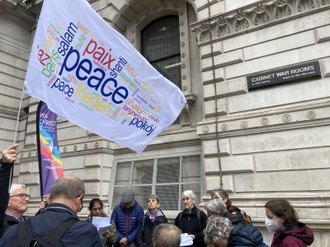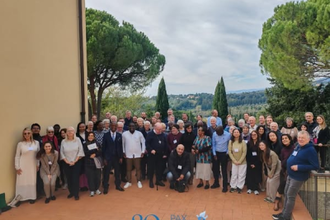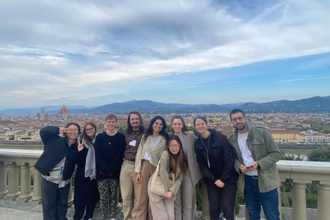Pax Christi's London Peace Walk to celebrate Nonviolence

Prayers near the Cabinet War Rooms
October 2 was Gandhi's birthday and the International Day of Nonviolence. To mark the end of international Catholic Nonviolence Days of Action and the UN Day of Nonviolence, London members of Pax Christi undertook a peace walk on Wednesday. We shared Pax Christi's vision of nonviolent peacemaking with government departments and Church leadership in Central London. Letters had been sent to them in advance with key messages.
The group of 18 people gathered at Edith Cavell's statue in Trafalgar Square, which is inscribed with her words: 'Patriotism is not enough. I must have no hatred or bitterness for anyone.' A reading from Marie Dennis and Ken Butigen suggested that, 'nonviolence is not just not violent but is muscular and actively engaged in preventing or interrupting the violence that is imbedded in our culture.' They said: 'Thousands and thousands of people, whole communities around the world are giving their lives to making the new story real. It is visible in brilliant work to root out systemic racism and structural injustice; to end the death penalty; to redress centuries of oppression against indigenous communities; to break habits of exploitation that are destroying Earth; to learn and promote restorative justice practices; to welcome migrants and refugees; to rid the world of nuclear weapons; to celebrate diversity and promote unwavering inclusion and respect for the rights of all people.'
We prayed, 'In a world crying out for love but still filled with too much hatred and violence help us to grow as peacemakers.'
Then we set off - just as the rain started - on the two-hour walk - through Trafalgar Square and down Whitehall. Our stops were at the Ministry of Defence, Downing Street, Foreign Office, Parliament Square and Westminster Cathedral. At each, nonviolent peacemaking was highlighted by Pat Gaffney, Valerie Flessati, and the Pax Christi England and Wales team led by Andrew Jackson. We waved our banners - one 'Pax Christi' and another giving the words for 'Peace' in many languages.
At the Ministry of Defence, we heard that economist Barbara Ward argued 50 years ago: 'We have to insist that far from disarmament being unusual and impossible, it is the normal state of civilised people inside their own communities. All procedures proposed for disarmament - elimination of private control over arms, the subsidisation of police forces, courts of law, mediation, arbitration and all other methods of settling disputes peacefully - are in fact practised every day inside domestic society. To say that we are not capable of this is simply nonsense. Most of the time this is actually what we do. The trouble is that we do not connect this perfectly normal method of human behaviour with any unit larger than the nation state.'
The group prayed: 'Light the flame of nonviolence in all human hearts: in scientists and engineers, the arms dealers and civil servants, the decision-makers and military, the voters and politicians.' The response: 'Bring your light to the nations. Your kingdom come. Your will be done.'
Across the road from Downing Street, we heard an extract from the 2017 World Peace Day message of Pope Francis: 'Certainly differences can cause frictions, but let us face them constructively and nonviolently, so that tensions and oppositions can achieve a diversified and life-giving unity, preserving, what is valid and useful on both sides.' He said, 'I pledge the assistance of the Church in every effort to build peace through active and creative nonviolence.' We prayed, 'for those who are working to improve international relationships, that they may find the true way of reconciliation.'
Outside the Foreign, Commonwealth & Development Office we heard that diplomacy, dialogue, advocacy, international law, opening channels of communication, creating partnerships are all features of nonviolence. However, in Pat Gaffney's words, "the direction and focus has become blurred and influenced by policies linked to security, trade, self-interest rather than international cooperation." A security guard seemed to strain to hear what was being said as a car pulled up and he checked its undercarriage with an inspection mirror before permitting it to enter. I re-focused again when a very wet 'peace' banner brushed my face in the wind!
We acknowledged: 'Our shame at the plight of those forced to leave family, home, country in their search for peace. Let it remind us of the need to welcome the stranger, those seeking refuge and asylum from countries where rights are abused or which are torn apart by war.
May we walk in your ways so that peace becomes a reality among us.'
In Parliament Square we stood before Gandhi's statue where several bunches of fresh flowers had been placed to mark his birthday. We thanked such witnesses who have taken on the risks of nonviolence in their struggle for justice and peace. Gandhi's words were read out: "Those who believe in nonviolence as the only method of achieving real freedom keep the lamp of nonviolence burning bright in the midst of the present impenetrable gloom…. The truth of a few will count; the untruth of millions will vanish even like the chaff before a whiff of wind."
In our prayer here, we confessed that for centuries our Church has betrayed the gospel message of peace and participated in wars, persecution, oppression, exploitation, and discrimination. The group said, 'we count on your light and your strength to help the Catholic Nonviolence Initiative to revive the nonviolent message of Jesus in the theology and practice of our Church, and to offer all Christians the tools for peacemaking, pardon, and reconciliation.'
The final stop was at the piazza of Westminster Cathedral. Pax Christi welcomed the recent document 'Called to be Peacemakers,' produced by the Catholic Bishops Conference of England and Wales, which invited the Catholic community to prayer, public witness, and pastoral service for peace. Yet, it lamented that Pax Christi, with its 80 years of experience in peacemaking, was not invited to be a part of this project. The bishops were urged to call on the experience of Pax Christi for future initiatives.
The group shared together the Vow of Nonviolence, using the prayer card produced by Pax Christi internationally. Extra copies were given out for people to share back in their parishes. Such dedicated peace activists! I was proud to stand with them.
Vow of Nonviolence:
RECOGNIZING THE VIOLENCE IN MY OWN HEART, yet trusting in the goodness and mercy of God, I vow for one year to practice the nonviolence of Jesus who taught us in the Sermon on the Mount:
"Blessed are the peacemakers, for they shall be called the sons and daughters of God…You have learned how it was said, 'You must love your neighbour and hate your enemy'; but I say to you, Love your enemies, and pray for those who persecute you. In this way, you will be daughters and sons of your Creator in heaven."
I vow to carry out in my life the love and example of Jesus:
by striving for peace within myself and seeking to be a peacemaker in my daily life;
by refusing to retaliate in the face of provocation and violence; by persevering in nonviolence of tongue and heart;
by living conscientiously and simply so that I do not deprive others of the means to live;
by actively resisting evil and working nonviolently to abolish war and the causes of war from my own heart and from the face of the earth.
God, I trust in Your sustaining love and believe that just as You gave me the grace and desire to offer this, so You will also bestow abundant grace to fulfil it.
LINK
Pax Christi Non Violence in Action: https://paxchristi.org.uk/resources/nonviolence-in-action/


















